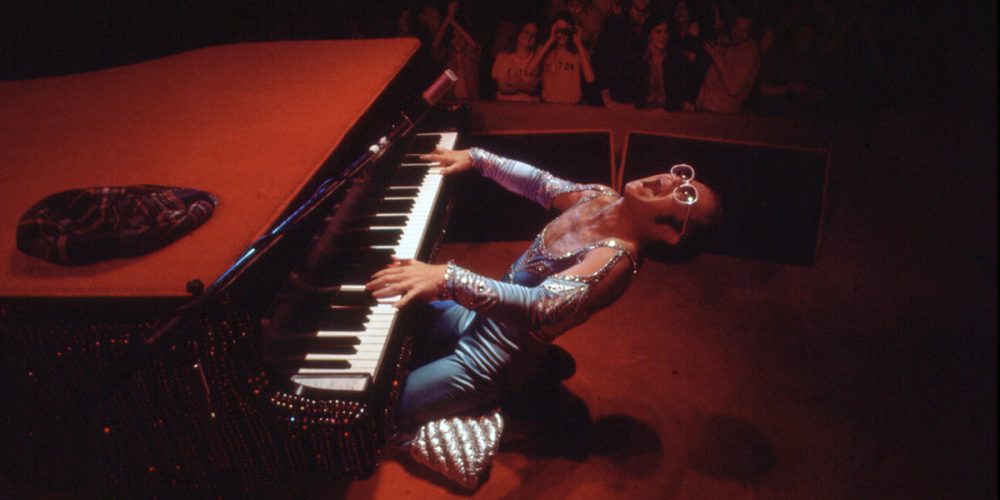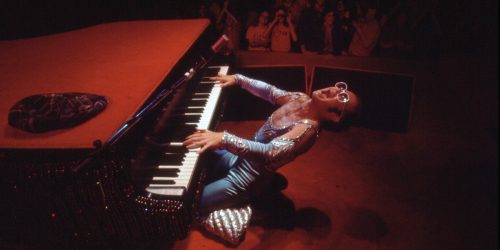Last year, it felt like there was an abundance of music documentaries at TIFF for an obvious reason: musicians aren’t actors or directors. The strikes so limited the red-carpet star power at the event that the programmers needed to find a way around them, and so getting Paul Simon, Lil Nas X, and even Nickelback on stage was a way to maintain some of that appeal. Luckily for fest goers, they kept it up even in a non-strike year. This year’s star wattage on a musical level seemed even brighter, bringing two Williams to Toronto—Pharrell with “Piece by Piece” and Robbie with “Better Man”—along with three of the most successful performers of all time in Bruce Springsteen, Elton John, and Paul Anka. This legendary trifecta dropped into Toronto with three films about their lives, all aimed directly at fans and drenched in what could politely be called hagiography. Each of these films avoids pretty much anything divisive or controversial about their subjects, but two of them largely overcome this myopia to convey what makes these people so special. The third just left me frustrated.
I must admit that my enjoyment of Thom Zimny’s “Road Diary: Bruce Springsteen and The E Street Band” is impacted by my love of its subject, especially his recent run of what could politely be called “old man records,” which Zinmy chronicled in “Western Stars” and “Letter to You,” two excellent, process-driven studies of how Springsteen has navigated this chapter of his career. “Road Diary” is a little lesser than these two due to its broader focus on Springsteen’s touring process, bringing his band back together for the first time since before the pandemic to rehearse and plan his 2023 tour. The best stuff in here is detail-oriented, and there’s just enough of it, but there’s also a bit too many shots of cheering fans to elevate it above fan service, even if I’m one of those fans.
What I liked most about “Road Diary” is barely mentioned in that I think it’s largely about how Springsteen’s experience making Springsteen on Broadway impacted his subsequent tour. He needed that show to be the same every night—that’s how Broadway works—and it taught him how to craft a setlist into a narrative. And so he did the same on tour, doing the opposite of the spontaneous, request-driven shows of the 2000s. He is such a smart musician that he’s able to use his discography like a playwright, such as when he segues from “Last Man Standing” into “Backstreets,” two songs written generations apart that are now in conversation with each other about loss and memory. It’s brilliant stuff.
Of course, the performance segments are pretty great too, such as when the Boss works out how to best capture their cover of “Nightshift” or the film barrels through what is basically a greatest hits section of the final hour of the three-hour show. Springsteen also cedes a lot of screen time to his band, appearing here not in interview but in the voiceover he’s written. The band gets the talking-head stuff, and it’s nice to hear people like Nils Lofgren and Max Weinberg talk about where they’ve been and where they are. There are a few too many times when Zimny seems to have taken something interesting and edited it down into a hagiographic soundbite about Springsteen’s sustained live power, but its arguable that his subject has earned that kind of adoration.
Another subject who has earned even more adoration than the film about him at TIFF provides is Elton John, the man at the center of “Elton John: Never Too Late,” a Disney+ doc that honestly should have been a series. You can’t do a music icon as big as John in under two hours, and directors R.J. Cutler and David Furnish struggle to figure out what chapters to rush through and where to linger. The films works best when they do the latter, highlighting how modern John is so supportive of young artists—there’s a great conversation with The Linda Lindas, for example—or just showing his deep love for his family. I could have watched much more of this stuff, and I could have spent hours with the glimpses of process seen here, such as in a mesmerizing archival scene wherein a young John gets the lyrics for “Tiny Dancer” from Bernie Taupin and figures out the melody. Give me that kind of stuff for days.
These great beats are buried in a bio-doc that’s relatively by-the-numbers. Cutler and Furnish start with a smart structure of moving back and forth between the years around when he played two sold-out shows at Dodger Stadium in 1975 and prepping to do so again almost a half-century later. Sir Elton narrates some of these chapters, allowing us a window into some of the darker chapters of his life, including his abusive upbringing, horrible relationship as he became a star, and his descent into addiction. He’s an open subject in a way that isn’t always true when it comes to bio-docs.
Honestly, the biggest problem with “Never Too Late” is that there’s not enough of it. It speeds through major moments in John’s career, and then settles lovingly in where he is today, but I think that would have been even stronger with more room to breathe. There’s something very moving about how much joy Elton John has brought to the world and how that giving has led him to such a happy, creative place, one in which he can still be inspired by the art that he has so confidently shaped.
Finally, there’s the one that just tips the scales too far into hagiography to recover in John Maggio’s “Paul Anka: His Way,” a movie that has too little to say about its timeless star other than to say he’s, well, timeless. If you don’t know about Paul Anka, a reminder that he’s been a legend probably for as long as you’ve been alive is valuable, and there’s something undeniably impressive about how strong he still sounds in every performance. He doesn’t phone it in. Never has. And it feels like he’ll be entertaining audiences until he literally can no more. That’s admirable. But the movie has too little to offer outside of that, and zips through formative years while spending too long in inconsequential ones. Why so much speed through the songwriting chapters to spend so long in performance footage shot in Japan last year? “His Way” is a reminder that not all hagiography is created equal and that there’s a way to do fan service well. This doesn’t really pull that off.
Part of the problem is right there in the TIFF synopsis: “… John Maggio had a Herculean task. How to properly capture a remarkable career spanning eight decades and filled with unprecedented global success that is still going strong?” I don’t think he ever really answers that question, landing on the hits like Anka likely picks a set list. We need a little “Head on Your Shoulder,” “Diana,” and, of course, “My Way.” To be fair, the material there is the best in the film, where Anka speaks about meeting with Sinatra and setting out to write him what is basically a farewell song. He wrote one of the best of all time.
“His Way” does elevate the reputation of Anka the Songwriter, and hints at how that has been key to his survival. He’s a hell of a showman, but it’s the songwriting that will keep people listening to Paul Anka long after we’re gone. My only problem is I knew that before watching the movie and didn’t quite get enough to add my understanding or respect for Anka that I already had. Maybe when you’ve been around that long, the music really does speak for itself.
Bruce Springsteen, Elton John, and Paul Anka all came to Toronto this year with movies. Read More


